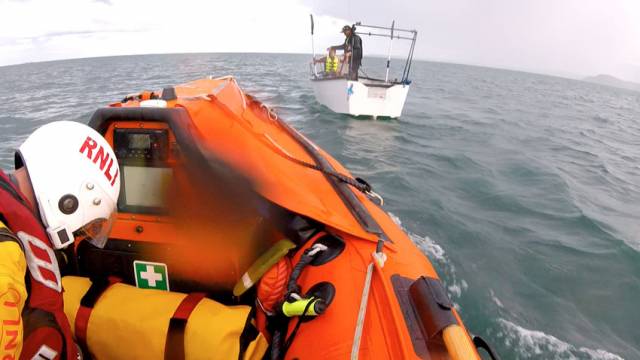#RNLI - It was a busy week for the volunteer crew at Larne RNLI last week with three launches for the Co Antrim lifeboats in three days.
On Tuesday 22 August, Larne’s all-weather lifeboat and inshore lifeboat were launched following a request from Belfast Coastguard after a small motor boat was reported overdue, having launched the previous day and making no contact since.
Following further information from Belfast Coastguard, the Larne inshore lifeboat made way to a motor boat north-west of the Number 1 buoy.
On making contact, it was confirmed the crew on board were those reported missing. All were well, with no engine difficulties, and they were able to make their way back to shore.
“It’s essential to have a clear plan when going to sea including checking the weather and tides before you leave and telling someone where you’re going and when you expect to be back,” said Larne RNLI helm Barry Kirkpatrick.
“If vessels do not return at the expected time we would urge members of the public to contact the coastguard by phoning 999 as soon as possible.”
The pagers sounded again on Wednesday 23 August at 6.15pm with reports of a 15ft motor boat with engine difficulties near Ballygally Head.
Larne RNLI’s inshore lifeboat crew were quickly on scene but no motor boat was visible in the Ballygally area. A search commenced and the vessel, with two men on board, was located three miles north-east of Ballygally head.
A tow was established and the boat taken to the safety of Tweeds Port in Carnfunnock.
“The casualty [vessel and crew were] located some distance off shore, unable to make their own way to safety,” said Larne RNLI deputy launching authority Philip Ford-Hutchinson. “We were pleased to see them wearing lifejackets and they made the correct decision in calling for help.
“We would encourage everyone going to sea to ensure your craft is in good condition, always wear a lifejacket and have a means of calling for help.”
On Thursday 24 August, both lifeboats were on exercise in Larne Lough with Mid and East Antrim Mayor Paul Reid and his wife Carol onboard when Belfast Coastguard tasked the all-weather lifeboat on service.
A member of the public reported an overturned vessel with four people on board in Drains Bay.
The lifeboat visitors were returned to shore and the all-weather lifeboat made its way to the scene, where the upturned vessels were found to be sea cadets performing capsize drills. This was a false alarm with good intent.
“This has been a busy week for our volunteer crew who drop everything to answer the call when their pagers sound,” said Larne RNLI coxswain Frank Healy. “Our crews are highly trained and skilled, and excellent team work ensured that all three launches were completed safely and successfully.”
Larne RNLI is currently looking for new volunteer crew members. If you have good general fitness, can work well in a team and have the ability to learn new skills, this role could be for you.
For further information and online application details, see the Larne Lifeboat Facebook page.
































































